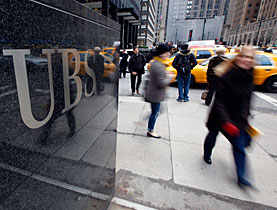Tax row squeezes Swiss expats in US

Swiss living in the United States are increasingly feeling the impact of a legal spat over alleged tax fraud by clients of the UBS bank.
Sarah Mastantuoni, a legal expert with the Organisation of the Swiss Abroad (OSA), says it is difficult to avoid being affected, but she is hopeful the situation will be resolved before long.
High-level negotiations are underway in the case of the 52,000 accounts of US citizens with the Swiss bank UBS suspected of tax fraud. Foreign Minister Micheline Calmy-Rey is also due to meet her American counterpart, Hillary Clinton, later this month, ahead of a ruling by a Miami judge.
The controversy has not only hit US citizens, but also many of the 74,000 Swiss expats in the US who have savings or business accounts as well as mortgages with Swiss banks.
It is a tricky situation for the Swiss living overseas, regardless of whether they have US securities or not.
swissinfo.ch: Swiss banks are reportedly excluding US citizens as clients over fears of being targeted by the Internal Revenue Service. How are banks treating Swiss expatriates in the US?
Sarah Mastantuoni: In the past Swiss citizens who moved abroad had no reason to liquidate existing bank accounts. Often these are savings or securities acquired over the years. It is still best to manage these funds through an account in Switzerland.
The tax policy of the US administration hits indeed not only US citizens but also other residents, foreigners including Swiss expats.
As a result of the pressure Swiss banks are losing interest in US clients. But the impact is also felt by Swiss living in the US. Our organisation had a few complaints. The new policy affects everybody, not just those who failed to declare their assets.
swissinfo.ch: What kind of complaints?
S.M.: There are expats who find themselves in a real quandary. Notably people who own or have inherited property and who often also have taken out mortgages in Switzerland.
In many cases Swiss banks closed their accounts or called in their mortgages.
swissinfo.ch: What do you recommend in such cases?
S.M.: There isn’t much they can do. Either they can open a bank account in the US or try another Swiss bank. Another option is an account with PostFinance, the finance unit of Swiss Post, because of its special status.
swissinfo.ch: Is an American bank likely to offer a Swiss citizen a mortgage on property in Switzerland?
S.M.: It is unlikely. We asked the banking ombudsman and the Bankers Association for advice. But there are not many options. Swiss banks are free to take or refuse clients.
swissinfo.ch: Are Swiss expats suffering as a result of the US policy and the excesses of the bank UBS on the overseas market?
S.M.: Whatever the reasons, pressure on Switzerland is mounting. The bank clients are the victims, not only those who might have something to hide but also ordinary people.
swissinfo.ch: Switzerland is currently renegotiating double taxation agreements with several countries as a result of international pressure. Should there be a special clause concerning Swiss expatriates in those accords?
S.M.: The issue is not the nationality but the country of residence and its rules. Swiss expatriates are subjected to the law of the country they live in.
The idea of an exchange of information is not new, but it might be simplified in some cases where the double taxation agreement is reviewed.
I don’t think expats should have a special status under such tax treaties.
swissinfo.ch: What about the idea of expatriates signing over their accounts in Swiss banks to family members in Switzerland to escape the eyes of the authorities?
S.M.: Our organisation would not recommend this. Instead we encourage Swiss expats to respect the law of whichever land they are in.
But it is a fact that there is a dilemma and no solution in sight.
Our organisation hopes that the existing problems are temporary. We cannot imagine the current situation persisting over a longer period of time.
Alexander Künzle, swissinfo.ch (adapted from German by Urs Geiser)

More
Organisation of the Swiss Abroad
Switzerland has been under pressure for its tax rates for holding companies, preferential rates for wealthy foreigners and its banking secrecy rules.
The US, but also Germany and France have criticised Switzerland for its fiscal policy.
Switzerland and its main trading partner, the European Union, agreed a withholding tax on the interests of assets deposited as part of a bilateral agreement.
The G-20 Group of industrialised nations and emerging economies branded Switzerland as a tax haven.
In March the government decided to ease banking secrecy for foreign clients in line with the standards of the Organisation for Economic Co-operation and Development (OECD).
Moves are underway to renegotiate double taxation agreements between Switzerland and at least 12 countries to come off a watch list and avoid sanctions.
A case is pending in the US over 52,000 accounts by American citizens with the UBS bank suspected of tax fraud.
About 680,000 Swiss nationals lived abroad last year, according to the official statistics.
Two out of three expats were based in a European Union country, mostly in neighbouring France and Germany.
Some 74,000 Swiss lived in the US in 2008 – making them the second largest group of Swiss expats.
Three out of four Swiss abroad have dual nationality.

In compliance with the JTI standards
More: SWI swissinfo.ch certified by the Journalism Trust Initiative











You can find an overview of ongoing debates with our journalists here . Please join us!
If you want to start a conversation about a topic raised in this article or want to report factual errors, email us at english@swissinfo.ch.